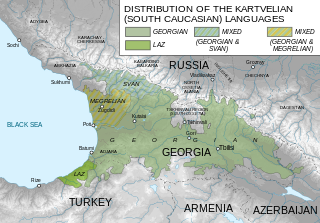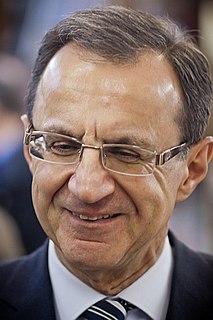
Sergo Konstantinovich Ordzhonikidze, born Grigol, was a Georgian Bolshevik, later member of the CPSU Politburo, the head of the Supreme Soviet of the National Economy and close associate of Joseph Stalin. Ordzhonikidze, Stalin and Anastas Mikoyan comprised what was jokingly referred to as the "Caucasian Clique."
Levan Razikashvili (1895-1923) was a Georgian police officer and victim of Soviet repressions.

Tbilisi State Medical University (TSMU) is a leading medical university in Tbilisi, Georgia. More than 85 years have passed since Tbilisi State Medical Institute was founded on the basis of the faculty of Medicine at Tbilisi State University (TSU). In 1992 Tbilisi State Medical Institute was renamed in Medical University.

Filipp Makharadze was a Georgian Bolshevik revolutionary and government official.
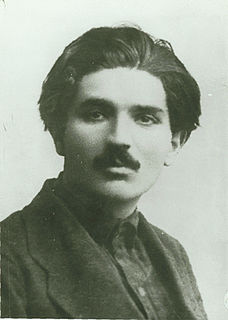
Vagarshak Arutyunovich Ter-Vaganyan was an Armenian communist party leader who was one of the first victims of Joseph Stalin's Great Purge. Ter-Vaganyan was one of sixteen Soviet intellectuals who stood as defendants during the Moscow Show Trials. He was accused of being part of the Trotskyite-Zinovievite centre which allegedly prepared terrorist acts against Stalin, Klim Voroshilov, Andrei Zhdanov, Lazar Kaganovich, Sergo Ordzhonikidze, Stanislav Kosior, and Pavel Postyshev. Under pressure, Ter-Vaganyan was forced to admit his "guilt." He was shot and his personal property was confiscated by the Soviet Union.

The Red Army invasion of Georgia, also known as the Soviet–Georgian War or the Soviet invasion of Georgia, was a military campaign by the Russian Red Army aimed at overthrowing the Social-Democratic (Menshevik) government of the Democratic Republic of Georgia (DRG) and installing a Bolshevik regime in the country. The conflict was a result of expansionist policy by the Russians, who aimed to control as much as possible of the lands which had been part of the former Russian Empire until the turbulent events of the First World War, as well as the revolutionary efforts of mostly Russian-based Georgian Bolsheviks, who did not have sufficient support in their native country to seize power without external intervention.

Polikarp "Budu" Mdivani was a veteran Georgian Bolshevik and Soviet government official energetically involved in the Russian Revolutions and the Civil War. In the 1920s, he played an important role in Sovietization of the Caucasus, but later led Georgian Communist opposition to Joseph Stalin's centralizing policy during the Georgian Affair of 1922. In the 1930s, he was persecuted for his support to the Trotskyite opposition and executed during the Great Purge.
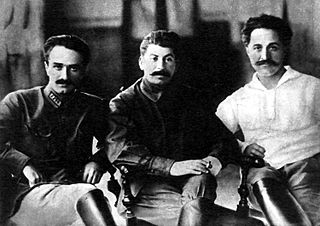
The Georgian affair of 1922 was a political conflict within the Soviet leadership about the way in which social and political transformation was to be achieved in the Georgian SSR. The dispute over Georgia, which arose shortly after the forcible Sovietization of the country and peaked in the latter part of 1922, involved local Georgian Bolshevik leaders, led by Filipp Makharadze and Budu Mdivani, on one hand, and their de facto superiors from the Russian SFSR, particularly Joseph Stalin and Grigol Ordzhonikidze, on the other hand. The content of this dispute was complex, involving the Georgians' desire to preserve autonomy from Moscow and the differing interpretations of Bolshevik nationality policies, and especially those specific to Georgia. One of the main points at issue was Moscow's decision to amalgamate Georgia, Armenia and Azerbaijan into Transcaucasian SFSR, a move that was staunchly opposed by the Georgian leaders who urged for their republic a full-member status within the Soviet Union.

The 12th Congress of the Russian Communist Party (Bolsheviks) was held during 17–25 April 1923 in Moscow. The congress elected the 12th Central Committee. It was attended by 408 delegates with deciding votes and 417 with consultative votes, representing 386,000 party members. This was the last congress of the Russian Communist Party (Bolsheviks) (RCP during Vladimir Lenin's leadership, though Lenin was unable to attend due to illness. Much of this Congress was taken up with Joseph Stalin's struggle against the Georgian Bolshevists. Stalin dominated the Congress with Grigoriy Ordzhonikidze and Mamia Orakhelashvili, moving against the Old Bolsheviks Budu Mdivani and Filipp Makharadze. Stalin accused the latter of the following:

Stalin is a 1992 television film, produced for HBO, starring Robert Duvall portraying Soviet leader Joseph Stalin. The film won three Golden Globe Awards among various awards including cinematography awards for Vilmos Zsigmond as well as best actor for Robert Duvall. Filming was done in Budapest, Hungary and Moscow, Russia, with extraordinary access to Kremlin buildings in the weeks surrounding the Dissolution of the Soviet Union.

Vahan is a village in the Gegharkunik Province of Armenia. When the village was founded in 1925, it was named in honor of Soviet politician and politburo member, Sergo Ordzhonikidze. Nearby upon a hill towards the eastern end of the village is an early Iron Age cyclopean fort.
The Kutaisi Auto Mechanical Plant (KAMP), formerly Kutaisi Automobile Plant — KAZ ; named in the Soviet Union in honour of Sergo Ordzhonikidze), is a truck factory located in Kutaisi, Georgia.
Andrey Ivanovich Zazroyev (Zazroshvili) was a Soviet and Georgian football player and manager.
Georgia participated in the Eurovision Song Contest 2011 in Düsseldorf, Germany, selecting their entry through a televised national final. This was the country's fourth participation in the contest since 2007.
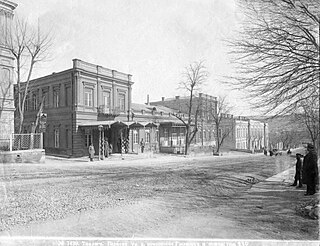
Giorgi Leonidze State Museum of Literature, Georgia was founded in 1930 upon the initiative of David Arsenishvili, a legendary museum-founder, who also was the creator of Tbilisi Theater Museum, and later the famous Andrej Rublow museum in Moscow.
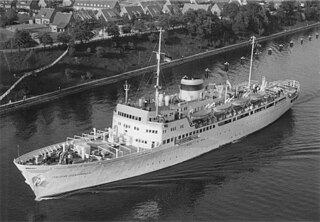
MS Grigoriy Ordzhonikidze was an ocean liner owned by the Soviet Union's Far East Shipping Company. She was built in 1959 by VEB Mathias-Thesen Werft, Wismar, East Germany. She was scrapped in 1992 in Alang, India. It was named after Georgian Bolshevik and later member of the CPSU Politburo Grigory Ordzhonikidze.

The Great Friendship is a 1947 opera by Vano Muradeli, to a libretto by Georgi Mdivani. It was premiered in Donetsk on 28 September 1947 and given its Moscow premiere at the Bolshoi Theatre, on 7 November 1947. Joseph Stalin attended a performance at the Bolshoi on 5 January 1948, and strongly disapproved of the opera. This led to a significant purge, often referred to as the Zhdanovshchina, of the musical life of the Soviet Union.
